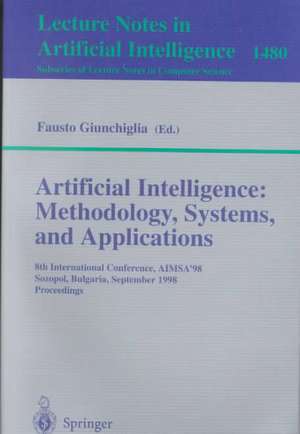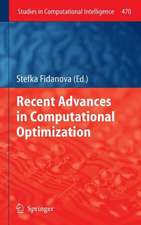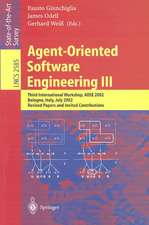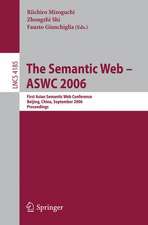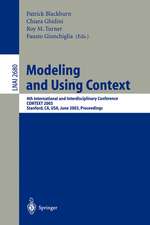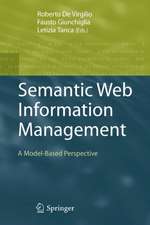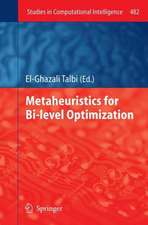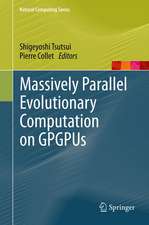Artificial Intelligence: Methodology, Systems, and Applications: 8th International Conference, AIMSA'98, Sozopol, Bulgaria, September 21-23, 1998, Proceedings: Lecture Notes in Computer Science, cartea 1480
Editat de Fausto Giunchigliaen Limba Engleză Paperback – 2 sep 1998
The 40 revised full papers presented were carefully reviewed and selected from a total of 90 submissions. The papers address the whole spectrum of current topics in AI, in particular case-based reasoning, multi-agent systems, planning and temporal reasoning, decision procedures, inductive reasoning, abduction, constraint-based reasoning, knowledge acquisition, knowledge-based systems, learning, natural language processing, temporal and causal reasoning, etc.
Din seria Lecture Notes in Computer Science
- 20%
 Preț: 1061.55 lei
Preț: 1061.55 lei - 20%
 Preț: 307.71 lei
Preț: 307.71 lei - 20%
 Preț: 438.69 lei
Preț: 438.69 lei - 20%
 Preț: 579.30 lei
Preț: 579.30 lei -
 Preț: 410.88 lei
Preț: 410.88 lei - 17%
 Preț: 427.22 lei
Preț: 427.22 lei - 20%
 Preț: 596.46 lei
Preț: 596.46 lei - 15%
 Preț: 448.04 lei
Preț: 448.04 lei - 20%
 Preț: 353.50 lei
Preț: 353.50 lei -
 Preț: 389.49 lei
Preț: 389.49 lei - 20%
 Preț: 309.90 lei
Preț: 309.90 lei - 20%
 Preț: 645.28 lei
Preț: 645.28 lei - 20%
 Preț: 763.23 lei
Preț: 763.23 lei - 15%
 Preț: 580.46 lei
Preț: 580.46 lei - 20%
 Preț: 310.28 lei
Preț: 310.28 lei - 20%
 Preț: 655.02 lei
Preț: 655.02 lei - 20%
 Preț: 1183.14 lei
Preț: 1183.14 lei - 20%
 Preț: 340.32 lei
Preț: 340.32 lei -
 Preț: 449.57 lei
Preț: 449.57 lei - 20%
 Preț: 591.51 lei
Preț: 591.51 lei - 18%
 Preț: 938.83 lei
Preț: 938.83 lei - 20%
 Preț: 337.00 lei
Preț: 337.00 lei - 20%
 Preț: 649.50 lei
Preț: 649.50 lei - 20%
 Preț: 607.40 lei
Preț: 607.40 lei - 20%
 Preț: 1414.79 lei
Preț: 1414.79 lei - 20%
 Preț: 1024.44 lei
Preț: 1024.44 lei - 20%
 Preț: 583.40 lei
Preț: 583.40 lei - 20%
 Preț: 453.32 lei
Preț: 453.32 lei - 20%
 Preț: 575.49 lei
Preț: 575.49 lei - 20%
 Preț: 1075.26 lei
Preț: 1075.26 lei - 20%
 Preț: 585.88 lei
Preț: 585.88 lei - 20%
 Preț: 825.93 lei
Preț: 825.93 lei - 17%
 Preț: 360.20 lei
Preț: 360.20 lei - 20%
 Preț: 763.23 lei
Preț: 763.23 lei - 20%
 Preț: 340.32 lei
Preț: 340.32 lei - 20%
 Preț: 504.58 lei
Preț: 504.58 lei - 20%
 Preț: 369.13 lei
Preț: 369.13 lei - 20%
 Preț: 580.93 lei
Preț: 580.93 lei - 20%
 Preț: 343.62 lei
Preț: 343.62 lei - 20%
 Preț: 350.21 lei
Preț: 350.21 lei - 20%
 Preț: 583.40 lei
Preț: 583.40 lei - 20%
 Preț: 583.40 lei
Preț: 583.40 lei - 15%
 Preț: 438.59 lei
Preț: 438.59 lei - 20%
 Preț: 341.95 lei
Preț: 341.95 lei - 20%
 Preț: 238.01 lei
Preț: 238.01 lei - 20%
 Preț: 538.30 lei
Preț: 538.30 lei
Preț: 343.44 lei
Preț vechi: 429.30 lei
-20% Nou
Puncte Express: 515
Preț estimativ în valută:
65.72€ • 71.37$ • 55.21£
65.72€ • 71.37$ • 55.21£
Carte tipărită la comandă
Livrare economică 22 aprilie-06 mai
Preluare comenzi: 021 569.72.76
Specificații
ISBN-13: 9783540649939
ISBN-10: 354064993X
Pagini: 520
Ilustrații: XII, 508 p.
Dimensiuni: 155 x 235 x 27 mm
Greutate: 0.72 kg
Ediția:1998
Editura: Springer Berlin, Heidelberg
Colecția Springer
Seriile Lecture Notes in Computer Science, Lecture Notes in Artificial Intelligence
Locul publicării:Berlin, Heidelberg, Germany
ISBN-10: 354064993X
Pagini: 520
Ilustrații: XII, 508 p.
Dimensiuni: 155 x 235 x 27 mm
Greutate: 0.72 kg
Ediția:1998
Editura: Springer Berlin, Heidelberg
Colecția Springer
Seriile Lecture Notes in Computer Science, Lecture Notes in Artificial Intelligence
Locul publicării:Berlin, Heidelberg, Germany
Public țintă
ResearchCuprins
The gain of failures: Using side-effects of anaphora resolution for term consistency checks.- An agent model for NL dialog interfaces.- Constraint solving in Logic Programming and in Automated Deduction: A comparison.- An extension of SATPLAN for planning with constraints.- Reasoning about generalized intervals.- Formalizing belief reports — The approach and a case study.- Extension calculus and query answering in prioritized default logic.- Study of symmetry in qualitative temporal interval networks.- A blackboard architecture for guiding interactive proofs.- Combining nonmonotonic reasoning and belief revision: A practical approach.- Modelling uncertainty with kripke's semantics.- Using linear temporal logic to model and solve planning problems.- Tailorable interactive agents for scheduling meetings.- Planning diagonalization proofs.- Theories and proofs in fault diagnosis.- Nonmonotonic reasoning under uncertain evidence.- Multicontext systems with importing contexts.- Planning via model checking in determistic domains: Preliminary report.- Acquisition of useful lemma-knowledge in automated reasoning.- Constructing translations between individual vocabularies in multi-agent systems.- Belief reconstruction in cooperative dialogues.- Model theoretic semantics for information integration.- A classification learning algorithm robust to irrelevant features.- Knowledge assimilation and proof restoration through the addition of goals.- Learning multiple predicates.- Modal reasoning and rough set theory.- Overcoming incomplete information in NLP systems — Verb subcategorization.- A framework for inductive learning based on subsumption lattices.- Dynamic learning — An approach to forgetting in ART2 neural networks.- A new approach to linguistic negation of nuancedinformation in knowledge-based systems.- SAT-based decision procedures for normal modal logics: A theoretical framework.- Version space retraction with instance-based boundary sets.- A new abstract logic programming language and its quantifier elimination method for disjunctive logic programming.- A new approach to learning Bayesian Network classifiers from data: Using observed statistical frequencies.- Abstraction as a form of elaboration tolerance.- System architecture of a distributed expert system for the management of a national data network.- Strategy selection for automated theorem proving.- An agent system for intelligent situation assessment.- Knowledge granularity and action selection.- Towards lifetime maintenance of case base indexes for continual case based reasoning.
Caracteristici
Includes supplementary material: sn.pub/extras
